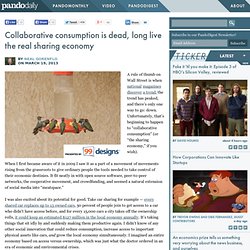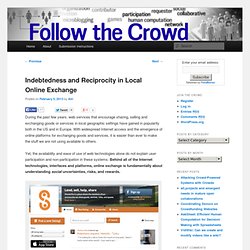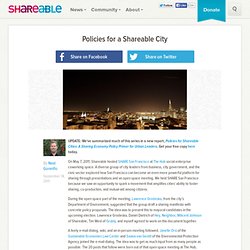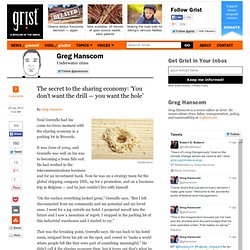

Peers. Supporting the Sharing Economy: A Q&A with Peers Co-Founder Natalie Foster. Innovations in person-to-person lending. 3 key success factors for sharing platforms. I've Seen the Future of Higher Ed... And It's Shareable U. Collaborative consumption is dead, long live the real sharing economy. By Neal Gorenflo On March 19, 2013 A rule of thumb on Wall Street is when national magazines discover a trend, the trend has peaked, and there’s only one way to go: down.

Unfortunately, that’s beginning to happen to “collaborative consumption” (or “the sharing economy,” if you wish). Fast Company. TrustCloud.com — Claim your Trustworthy Data & Use it Anywhere. OuiShare - Creative community for the Collaborative Economy. Indebtedness and Reciprocity in Local Online Exchange. During the past few years, web services that encourage sharing, selling and exchanging goods or services in local geographic settings have gained in popularity both in the US and in Europe.

With widespread Internet access and the emergence of online platforms for exchanging goods and services, it is easier than ever to make the stuff we are not using available to others. Yet, the availability and ease of use of web technologies alone do not explain user participation and non-participation in these systems. Behind all of the Internet technologies, interfaces and platforms, online exchange is fundamentally about understanding social uncertainties, risks, and rewards. Sharetribe supports everyday exchange in local communities. The biggest identified challenges of exchange activity were surprising: While participants did indeed discuss the requirement of reciprocity, they did so primarily from the viewpoint of avoiding indebtedness. On the skill of sharing and the sharing of skills. Helen, a good friend of mine in Transition Norwich, used to tell this hilarious anecdote about the time she decided to ask her neighbour if she could borrow a cake tin.

Motivated by a transition ethos of not wanting to buy a new one if it wasn't necessary she plucked up the courage and faced the slightly confused awkwardness of the exchange with her neighbour. Having been lent a cake tin, she then was racked with worry about damaging it or not giving it back soon enough. In true Helen style it is a slightly melodramatic example, but it beautifully illustrates my topic for this post. One of the most important skills we have lost, that facilitates the learning and practicing of all the other skills, is the skill of sharing. This is particularly true if you are on the receiving end, we are still fairly good at telling other people what to do or at doing a good deed, but so many people are no longer comfortable with asking for help or to borrow something. Sharetribe.com. Using Tribes to Enable Sharing Within Offline Networks. Neal Gorenflo wrote a thoughtful post on the issues related to neighborhood stuff sharing. In the post he noted that while there are a huge number of sharing sites out there, so far none of them has managed to gain significant traction.
In the end of the post he offered some suggestions on how to get neighbors to share their stuff. One of the suggestions, "Sharing Meets Community Organizing", really struck a chord. I believe the answer is to empower the offline networks we already have - whether they are our neighbors, fellow students or colleagues at work. We need to give people tools to share within these networks, and the community organizers the tools to facilitate this sharing.
This is the approach we are taking with Sharetribe. These marketplaces are highly customizable: people can change the texts, logos and soon also the colors to match the look & feel of their community. All this makes the people feel it’s really their own thing - a place where they feel like home. Open Source. CouchSurfing. Couchsurfing International Inc. is a hospitality exchange and social networking website. The website provides a platform for members to "surf" on couches by staying as a guest at a host's home, host travelers, or join an event. Couchsurfing International Inc refers to two separate legal entities. The first was founded in 2003 as a non-profit organization, and was liquidated in 2011. Its assets were sold to the private for-profit corporation Better World Through Travel, later renamed Couchsurfing International, Inc.,[1] which defines itself as “a mission-driven for-profit corporation”.[5] As of August 2012, the company has raised $22.6 million in investment capital, while reporting no revenue.[5] Etymology[edit] Couchsurfing is a neologism referring to the practice of moving from one friend's house to another, sleeping in whatever spare space is available, floor or couch, generally staying a few days before moving on to the next house.
Membership and site[edit] Demographics[edit] Shareable: Sharing by design. What’s Mine is Yours: The Rise of Collaborative Consumption. Mesh - the living network of sharing. Policies for a Shareable City. UPDATE: We've summarized much of this series in a new report, Policies for Shareable Cities: A Sharing Economy Policy Primer for Urban Leaders.

Get your free copy here today. On May 7, 2011, Shareable hosted SHARE San Francisco at The Hub social enterprise coworking space. A diverse group of city leaders from business, city government, and the civic sector explored how San Francisco can become an even more powerful platform for sharing through presentations and an open space meeting. We held SHARE San Francisco because we saw an opportunity to spark a movement that amplifies cities' ability to foster sharing, co-production, and mutual-aid among citizens.
During the open space part of the meeting, Lawrence Grodeska, from the city’s Department of Environment, suggested that the group draft a sharing manifesto with concrete policy proposals. A lively e-mail dialog, wiki, and an in-person meeting followed. But guess what? It's Time to Go Big: A Vision for the Sharing Economy. The sharing economy is in a regulatory crisis.

Airbnb’s hotel tax issues, the cease and desist orders slapped on peer mobility apps Sidecar and Lyft, and other brushes with the law have catalyzed a flurry of organizing and dialogue about sharing economy regulation. It started with the launch of San Francisco’s Sharing Economy Working Group in April, and was followed with the formation of the Bay Area Sharing Economy Coalition in August, lobbying by the Collaborative Economy Coalition at the Democratic National Convention in September. SPUR’s Gabriel Metcalfe wrote a provocative opinion piece about it earlier this month, and Shareable’s April Rinne and NYU professor Arun Sundararjan offered much commented counterpoints. The secret to the sharing economy: ‘You don’t want the drill — you want the hole’ Neal Gorenflo had his come-to-Jesus moment with the sharing economy in a parking lot in Brussels.

It was June of 2004, and Gorenflo was well on his way to becoming a bona fide suit. He had worked in the telecommunications business and for an investment bank. Now he was on a strategy team for the global shipping company DHL, up for a promotion, and on a business trip in Belgium — and he just couldn’t live with himself. “On the surface everything looked great,” Gorenflo says. “But I felt disconnected from my community and my potential and my loved ones.
That was the breaking point, Gorenflo says.